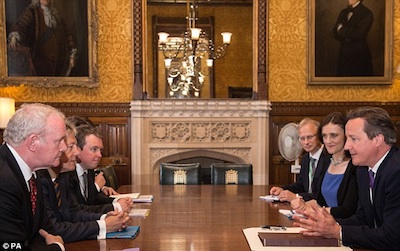
Sinn Fein this week met with the British Prime Minister David Cameron for the first time.
Party leader Gerry Adams, who was joined at the Westminster meeting with Mr Cameron by Mr McGuinness, Dublin TD Mary Lou McDonald and Fermanagh-South Tyrone Michelle Gildernew, said there had been a “frank discussion” and that they had agreed to meet again in the autumn.
“The meeting provided the Sinn Fein leadership with an opportunity to express our serious concerns to Mr Cameron at his government’s disconnect from its responsibilities under the terms of the Good Friday and other agreements,” the Sinn Fein leader said. “In our view the political process in the north of Ireland has deteriorated in recent months.”
Mr Adams said the British prime minister had recently begun to indicate “an awareness that the process is in difficulties” and that he did so again yesterday.
“If he is serious about making progress then the British government has to defend the integrity of the Good Friday Agreement and engage positively with the process,” the Louth TD said.
“This includes supporting the Haass compromise proposals and implementing outstanding issues arising from the Good Friday and other agreements.”
The Sinn Fein leader said his party was engaging constructively in the negotiations and were committed to achieving progress.
“However, this will only happen when the two governments act positively as champions for change and co-equal guarantors of the Good Friday Agreement.”
There was also a separate meeting between David Cameron and Peter Robinson and Martin McGuinness, and economic matters in the Six Counties were among the matters discussed. Afterwards, Robinson repeated Cameron’s line on welfare reform and condemned Sinn Fein.
The DUP leader claimed penalties imposed by Sinn Fein’s failure to endorse Tory welfare cuts would cost the Six County a billion pounds over the next five years.
“The finance minister will have to adjust budgets to deal with the penalties caused by Sinn Fein,” Mr Robinson claimed. “This will mean tough decisions and less money being available for hospitals, schools and policing.”
A series of London engagements coincided with the first anniversary of the so-called economic pact, a series of measures which gave the Stormont executive additional borrowing powers.
Sinn Fein also met Labour leader Ed Milliband, and the party attended a historical panel discussion at the Irish embassy. That event was originally due to be held at House of Commons Speaker John Bercow’s house, but was moved to the Irish Embassy when he refused to allow Sinn Fein MPs to attend, on the basis of Sinn Fein’s abstentionist policy at Westminster.
Just one of the party’s MPs, Francie Molloy, ended up attending the discussion, with the others ironically at Westminster for the party’s summer reception. Mr Molloy said it was “regrettable” that the event’s location had to be changed.
“I think for some reason the Speaker seems to be out of tune with the rest of what is happening both at monarchy level and at parliamentary level,” he said.
“I think it would have been nice just to have been in Westminster debating it. We weren’t in Westminster at that time (1914) and we are still not taking our seats in it, but we are part of the institutions so it would have been nice just to have that recognition of the progress that has been made.”
In the discussion, former 26-County Taoiseach John Bruton condemned the leaders of the 1916 Easter Rising who he said had “introduced violence” into Irish nationalist politics.
“If there hadn’t been the introduction of violence into nationalism in that demonstrably dramatic way in Easter week.. there wouldn’t have been a Civil War,” Mr Bruton told the audience, which included a number of prominent British historians.
He also claimed the Rising had ‘damaged’ the Irish psyche, and that Patrick Pearse had ‘justified the Provos’ [the Provisional IRA].
![[Irish Republican News]](https://republican-news.org/graphics/title_gifs/rn.gif)
![[Irish Republican News]](https://republican-news.org/graphics/title_gifs/harp.gif)

